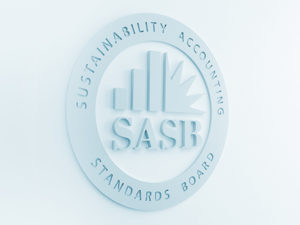
Janine Guillot
CEO, The SASB Foundation
Click here to explore SASB’s updated Implementation Primer.
Whether it’s in the board room, the C-suite, or in the capital markets that help fuel economic growth and sustainable development, useful information is the bedrock upon which effective decision-making rests. At SASB, we aim to provide sustainability disclosure standards that ultimately improve the information available to decision makers. We believe that what you measure matters, how you communicate it matters, and that both measurement and disclosure are important to financial analysis and the healthy functioning of our economy.
Investors tell us they are interested in sustainability issues, but they struggle to find data that is comparable, consistent, and reliable. Corporate professionals tell us they are pulled in many different directions by specialised requests for sustainability data. Both groups would benefit from standardised disclosure on the subset of sustainability issues that matter most to long-term financial performance in a particular industry.
SASB standards identify sustainability topics and related performance metrics that are likely to have financially material impacts on companies in each of 77 industries. Companies can voluntarily use SASB standards to support internal and external reporting on these issues that is consistent across time periods and comparable across peers. Companies can also focus on building strong systems of internal control and governance for these key performance metrics, ensuring the information they disclose to investors is reliable.
With more standardised disclosure across an industry, companies and investors can benchmark performance on business-critical sustainability matters—topics like product safety in the auto industry, data security in the tech sector, and water management among beverage manufacturers. Although the SASB metrics are “non-financial,” they capture performance on key operational matters that drive long-term value creation. For companies, they highlight key areas of risk to be mitigated and opportunities where improved performance can lead to cost efficiencies, enhanced revenue, or competitive advantage. For investors, they answer the question, “If I were looking to buy or sell shares in a company or to more effectively engage with company directors and management to discuss strategy and performance, what would I look at besides the financial statements?”
Today we launch an Implementation Primer that is intended to assist companies in using SASB standards—that is, it aims to help them select appropriate sustainability accounting standards for their organisation and effectively embed key topics and metrics into core management and reporting functions. SASB standards offer companies an opportunity to enhance accounting’s traditional role as “the language of business,” communicating the relevant and reliable information that decision makers want and markets need.
We invite you to explore this new guidance, along with the SASB standard for your industry, and we thank you for your consideration.



